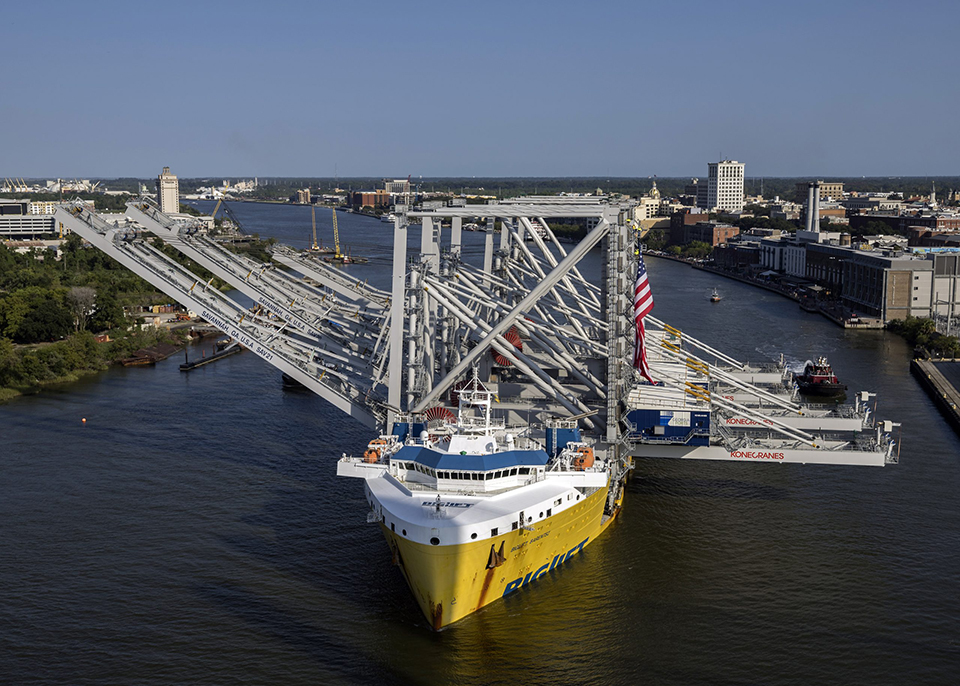
The Port of Savannah received four Super Post-Panamax ship-to-shore cranes Thursday, August 24, upgrading the crane fleet to 34 machines at Garden City Terminal after four older cranes are retired and recycled.
“Along with the completion of our project to improve Berth 1, these cranes will help deliver faster turn times to our ocean carrier customers, including the largest vessels calling on the U.S. East Coast,” said Griff Lynch, Georgia Ports Authority president and CEO. “No other terminal in the nation can bring more cranes to bear, or match the efficiency, productivity and global connectivity of the Port of Savannah.”
Designed by Konecranes of Finland, the all-electric cranes arrived on the vessel BigLift Barentsz.
Two of the cranes will be 295 feet tall and two will be 306 feet tall at the highest point when fully assembled. The reach of the cranes will be 22 and 24 containers wide, respectively. The taller cranes will be offloaded at Berth 1 at Garden City Terminal, the others will be installed on the upriver end of the terminal, at Berth 9.
Ship-to-shore cranes are the workhorses of container port operations, unloading and loading cargo from the container ships that call on the port.
GPA received a previous batch of four cranes in February to work the recently renovated Berth 1, which is now capable of serving vessels with a capacity of 16,000+ twenty-foot equivalent container units. The cranes and improved dock increase Garden City Terminal berth productivity by 25 percent or 1.5 million TEUs of annual capacity.
The new equipment is part of GPA’s $1.9 billion infrastructure improvement plan to keep pace with future supply chain needs.
“The ratio of GPA’s economic impact equates to roughly one job per nine TEUs moved,” said Stacy Watson, director of economic and industrial development at GPA. “By expanding our annual capacity by 3 million TEUs over the next three years, GPA is also increasing its job-supporting capability by more than 300,000 jobs for Georgians.”
Georgia’s deepwater ports and inland barge terminals support more than 561,000 jobs throughout the state annually, and contribute $33 billion in income, $140 billion in revenue and $3.8 billion in state and local taxes to Georgia’s economy. CNBC ranked Georgia #1 in the U.S. for infrastructure in America’s Top States for Business in 2023.


Chattooga Local News
Gov. Kemp Announces $26.5M for Local Transportation Projects

Bulloch Public Safety
06/25/2025 Booking Report for Bulloch County

Chattooga Local News
ICE Arrests 11 Iranian Nationals Illegally in the U.S. Over the Weekend

Bulloch Public Safety
06/09/2025 Booking Report for Bulloch County

Bulloch Public Safety
06/23/2025 Booking Report for Bulloch County

Bulloch Public Safety
06/02/2025 Booking Report for Bulloch County

Bulloch Public Safety
06/16/2025 Booking Report for Bulloch County

Bulloch Public Safety
06/19/2025 Booking Report for Bulloch County






